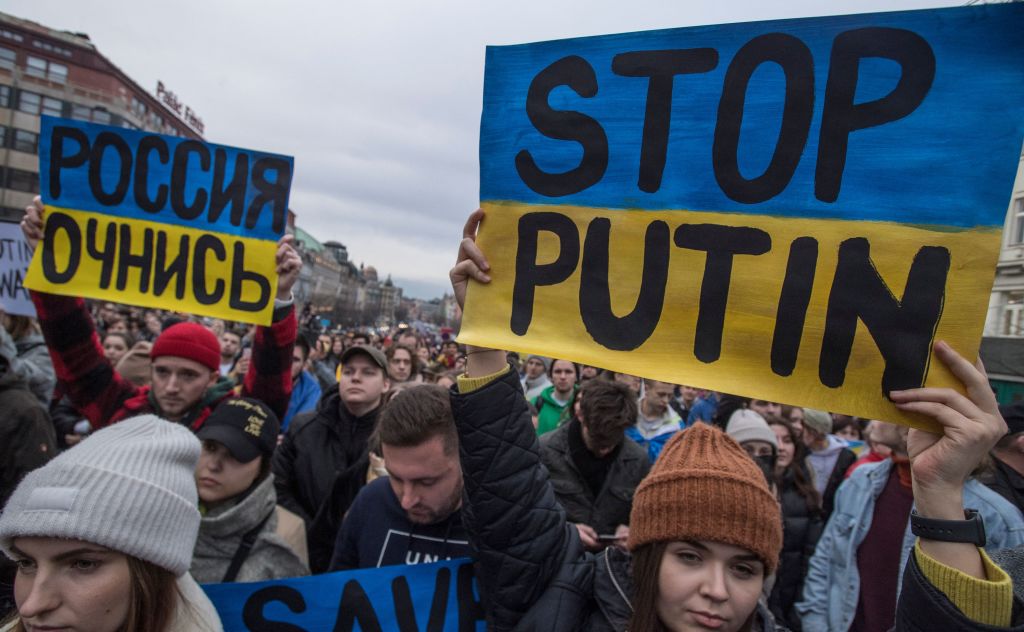Supporting Russia’s brutal invasion of Ukraine is now socially and morally beyond the pale in most of the western world. Even being wary of arms deliveries to Ukraine is, in most places, considered wrong. But in the Czech Republic things are being taken a step further, as those who express controversial views of the war are prosecuted under legal restrictions on free speech.
Ambiguous laws are suddenly being used to criminalise the views of a significant portion of the population
A young man who attended an anti-government protest in Prague earlier this year wearing a backpack with a ‘Z’ sticker and a jacket with the emblem of the Wagner Group stitched onto the sleeve has been handed a suspended six-month prison sentence, fined, and – in bizarrely medieval fashion – banned from staying within Prague city limits for a year. Police detained him after spotting the symbols on his backpack and put him under investigation for ‘denying, questioning, approving and justifying genocide,’ which is a criminal offence.
This is not the only case of its kind. A primary school teacher in Prague has been investigated by police after pupils recorded her saying ‘nothing is happening’ in Kyiv and that ‘Ukrainian Nazi groups’ have been killing Russians in the Donbas since 2014. She lost her job and police have submitted her case for indictment, again for the offence of approving genocide. She could face between six months and three years in jail.
In the most well-known of these cases, the ringleader of the Czech Republic’s powerful anti-government protest movement, Ladislav Vrabel, faces trial for spreading ‘alarmist messages’ with his claim that the Czech Republic would use nuclear bombs against Russia as part of the start of a global nuclear war. With Czech police reserving the right to lock you up if you ‘intentionally cause the danger of serious concern to at least part of the population of a place by spreading an alarmist message that is false,’ he could face up to two years in prison.
The Czech Republic’s legal restrictions on free speech are nothing new. They predate the war in Ukraine and were previously used to prevent expressions of Nazism, including the display of the swastika. Now, though, ambiguous laws previously used against a tiny minority of lunatics and troublemakers are suddenly being used to criminalise the views of a significant portion of the population.
A major recent survey found that 48 per cent of Czechs are either ‘not sure’, ‘misinformed’, or ‘strongly pro-Russian’ when it comes to their views of the Ukraine war. The latter two groups, both of which were described by the polling company as having ‘great faith in the Russian narrative’, make up 14 per cent of the country. Taking into account the social unacceptability of admitting that you support Russia, the real percentage is probably higher.
Is it democratically acceptable that the Czech state would, in theory, subject all of these people to legal proceedings if they honestly expressed their views on the Ukraine war? The government would argue that such views are not valid because they are ‘misinformed’ and based on ‘disinformation’ – concepts which have gained enormous traction in the Czech Republic since the invasion began. But for a country which freed itself from Communism for the sake of freedom of expression and thought not too long ago, there’s a strange lack of controversy over the cases being brought before the courts.
The muted reaction is even more surprising given the ambiguous nature of the laws being applied. Only a handful of countries have officially labelled Russian war crimes in Ukraine as genocide, for example. It is conceivable that those being prosecuted were not even aware that the Czech state deems Russia’s invasion to be genocide.
There are also ambiguities in the crimes themselves. Prosecution for use of the ‘Z’ symbol is particularly striking given its wider presence in Czech society. It’s common knowledge that one of the ways in which the Czech Republic’s pro-Russian population quietly expresses rebellion against free speech restrictions is through putting learner driver plates on their cars – which in the Czech Republic bear the letter ‘Z’, for ‘Začátečník’.
Despite the lack of controversy over the criminal cases, free speech is slowly but surely becoming one of the country’s biggest political issues. The current Czech leadership is hawkish in pursuit of its own ideas about how to protect western-style liberal democracy, encouraging an environment in which dissent against its Ukraine policy is viewed as ‘extremism.’ A recent Interior Ministry report into extremism and hatred in the Czech Republic included extensive discussion of views of the Ukraine war among ‘xenophobic populist subjects’ and other political entities.
Meanwhile the country’s lauded new president, Petr Pavel, says all the right things about treating opponents with respect, but in a TV debate earlier this year, he suggested that he would refuse to accept members of the anti-western populist SPD party – which polls at around 10 per cent – in ministerial posts in any future government. Some Czech commentators pointed out that this method for safeguarding Pavel’s view of democracy would constitute a ‘dangerously authoritarian’ interpretation of his largely ceremonial presidential role.
Such glaring contradictions are becoming more common in an intellectual climate where major differences of opinion on the biggest issue of the day are not just unacceptable, but actually illegal. This should give pause for thought in a country that’s all too familiar with the impulse to silence those who dissent.







Comments